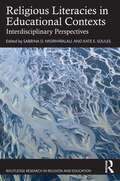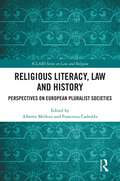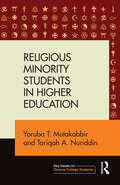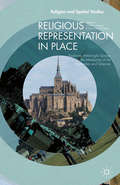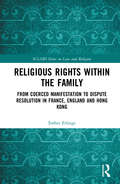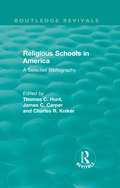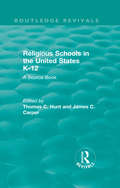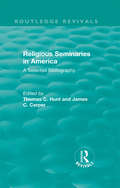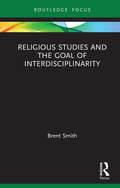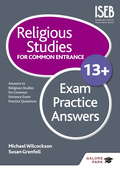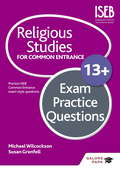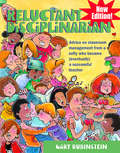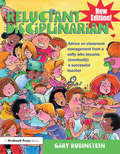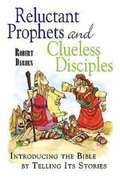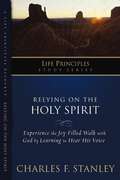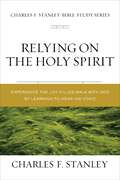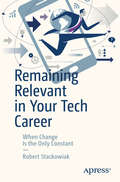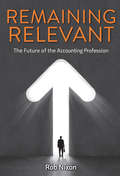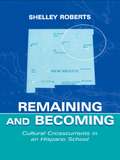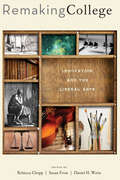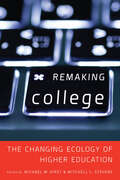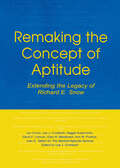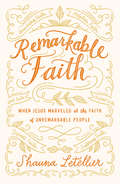- Table View
- List View
Religious Literacies in Educational Contexts: Interdisciplinary Perspectives (Routledge Research in Religion and Education)
by Sabrina D. MisirHiralall Kate E. SoulesReligious Literacies in Educational Contexts: Interdisciplinary Perspectives provides an overview of current scholarship on religious literacy and its practical applications in public life.As an emerging, interdisciplinary field, religious literacy is vital in understanding how diverse religious beliefs shape social and political landscapes. This volume aims to deepen the conversation among scholars and practitioners by offering actionable recommendations for promoting religious literacy in educational contexts. Key questions addressed include: What does religious literacy mean in different contexts? Why is religious literacy important today? How can educators and scholars foster religious literacy in public settings? This book provides an exploration of these questions as the authors offer an overview of the current scholarship on religious literacy along with its applications in the classroom for both scholars and practitioners.This book is designed for scholars, educators, and practitioners interested in the intersecting fields of religion, education, and public life highlighting the significance of religious literacy in various disciplines and contemporary issues by providing readers with insights and strategies to enhance their understanding and teaching of religious diversity.
Religious Literacy, Law and History: Perspectives on European Pluralist Societies (ICLARS Series on Law and Religion)
by Alberto Melloni Francesca CadedduThe book profiles some of the macro and micro factors that have impact on European religious literacy. It seeks to understand religious illiteracy and its effects on the social and political milieu through the framing of the historical, institutional, religious, social, juridical and educational conditions within which it arises. Divided into four parts, in the first one, One literacy, more literacies?, the book defines the basic concepts underpinning the question of religious illiteracy in Europe. Part II, Understanding illiteracies, debating disciplines?, highlights the theological, philosophical, historical and political roots of the phenomenon, looking at the main nodes that are both the reasons religious illiteracy is widespread and the starting points for literacy strategies. Part III, Building literacy, shaping alphabets, examines the mix of knowledge and competences acquired about religion and from religion at school as well as through the media, with a critical perspective on what could be done both in the schools and for the improvement of journalists’ religious literacy. Part IV, Views and experiences, presents the reader with the opportunity to learn from three different case studies: religious literacy in the media, religious illiteracy and European Islam, and a Jewish approach to religious literacy. Building on existing literature, the volume takes a scientific approach which is enriched by interdisciplinary and transnational perspectives, and deep entrenchment in historical methodology.
Religious Literacy: What Every American Needs to Know and Doesn't
by Stephen ProtheroWe as a people know little about the religions we champion.
Religious Minority Students in Higher Education (Key Issues on Diverse College Students)
by Yoruba T. Mutakabbir Tariqah A. NuriddinThe most recent addition to the Key Issues on Diverse College Students series bridges theory to practice in order to help student affairs and higher education professionals understand the needs and experiences of religious minorities on college campuses. Religious Minority Students in Higher Education explores existing literature and research on religious minorities on American college campuses, discusses the challenges and needs of religious minorities on campus, and provides best practices and recommendations. Providing a foundational, nuanced approach to religious minorities in the American college context, this important resource will help educators at colleges and universities promote religious pluralism and tolerance to support student learning outcomes and campus inclusion among students of diverse religious backgrounds.
Religious Representation in Place: Exploring Meaningful Spaces at the Intersection of the Humanities and Sciences (Religion and Spatial Studies)
by Mark K. George Daria Pezzoli-OlgiatiReligious Representation in Place brings together an interdisciplinary group of scholars from the Humanities and Sciences to broaden the understanding of how religious symbols and spatial studies interact. The essays consider the relevance of religion in the experience of space, a fundamental dimension of culture and human life.
Religious Rights within the Family: From Coerced Manifestation to Dispute Resolution in France, England and Hong Kong (ICLARS Series on Law and Religion)
by Esther ErlingsIt is often asserted that ‘A family that prays together, stays together’. But what if a child no longer wishes to pray? This book analyses the law in relation to situations where parents force their children to manifest the parental religion. From thorough examination of international law it argues that, unlike what is generally believed, the human rights regime does not grant parents a right to impose manifestations of their religion on their children. Instead, the author proposes to regard coerced manifestations as a limitation on children’s right to freedom of manifestation, based on national laws that give parents rights at the domestic level under principles such as parental responsibility. The book focuses on two aspects of States’ positive obligations in this regard. First, the obligation to provide a regulatory framework that can protect children’s right to freedom of manifestation, and restricts limitations to those that are proportionate or 'necessary in a democratic society'. Second, to provide access to remedies, which it is argued should consist of access to a family-friendly infrastructure for dispute resolution available to parents and children in conflict over religious manifestation. Both depend heavily on the way States balance power between parents and children at the national level. The book includes three case studies and social research of jurisdictions that offer different perspectives under the principles of parental authority (France), parental responsibility (England) and parental rights (Hong Kong).
Religious Schools in America: A Selected Bibliography (Routledge Revivals)
by Thomas C. Hunt James C. Carper Charles R. KnikerPublished in 1986, this selected bibliography considers private schools that are religiously affiliated. Divided into several sections the book open with chapters covering the most influential general books on religion and schooling and offers summaries and analysis of court decisions and commentaries on the issues of government aid and regulation. The book goes on to provide entries of the schools operating in the United States by seventeen religious groups, entries are annotated by experts from the field. The final section of the book considers statements on religious schools made by both public school educators and religious school advocates; formal and informal interactions between the public and religious schools; and the concept of the education of the public by religious and public schools. This work pulls together a wealth of reference material, mainly on religious schools, and provides a much-needed resource for those interested in religious schooling, whether researcher, scholar, student or policy-maker.
Religious Schools in the United States K-12: A Source Book (Routledge Revivals)
by Thomas C. Hunt James C. CarperFirst published in 1993 this volume is an extension and revision of the 1986 book entitled Religious Schools in America: A Selected Bibliography. This new version contains additional annotated bibliographies of the various denominational schools as well as discussing governmental relation to each setting in the years from 1985 to 1992. This version also covers Greek Orthodox and Muslim schools that were not part of the previous volume and includes a chapter on the growth of home schooling which is often influenced by religion. Finally, unlike the previous edition, this book only considers religious schools, rather than the religious aspect or function of public schooling. Each section includes a short chapter followed by an extensive annotated bibliography making it a useful source for anyone looking for information in the area.
Religious Seminaries in America: A Selected Bibliography (Routledge Revivals)
by Thomas C. Hunt James C. CarperPublished in 1989, this bibliography considers religious seminaries that are affiliated with the various denominations of the theological institutions established in the United States by the Protestants in the early 1800s, it also considers non-denominational and independent settings. Divided into two sections, the first short section considers the relationship between the civil governments and the seminaries, the second, organized by denomination into 15 chapters provides an extensive bibliography with annotations. The work pulls together a wealth of reference material and identifies salient works, whether book, article, dissertation or essay, to provide a much-needed resource for those interested in seminary education in the United States, whether scholar, student, policy maker, or interested citizen.
Religious Studies and the Goal of Interdisciplinarity (Routledge Focus on Religion)
by Brent SmithThis book offers a survey of the development of interdisciplinarity in religious studies within academia and offers ways for it to continue to progress in contemporary universities. It examines the use of the term ‘interdisciplinary’ in the context of the academic study of religion and how it shapes the way scholarly work in this field has developed. The text uses two main elements to discuss religious studies as a field. Firstly, it looks at the history of the development of religious studies in academia, as seen through an interdisciplinary critique of the university as an epistemological project. It then uses the same interdisciplinary critique to develop a foundation for a 21st-century hermeneutic, one which uses the classical concepts reprised by that interdisciplinary critique and retools the field for the 21st century. Setting out both the objects of religious studies as a subject and the techniques used to employ the study of those objects, this book offers an invaluable perspective on the progress of the field. It will, therefore, be of great use to scholars of research methods within religious studies.
Religious Studies for Common Entrance 13+ Exam Practice Answers
by Michael Wilcockson Susan GrenfellThis book provides all answers, as well as marking guidance, to the questions in the accompanying title Religious Studies for Common Entrance 13+ Exam Practice Questions. - Endorsed by ISEB- Provides extensive advice and guidance to help pupils achieve top marks - Saves time marking work and helps identify areas requiring further study
Religious Studies for Common Entrance 13+ Exam Practice Questions
by Michael Wilcockson Susan GrenfellThis book contains over 900 exam-style questions based on Syllabus A of the 13+ ISEB Common Entrance exam; it is ideal for pupils who are looking to achieve top grades in entrance exams at 13+. The guide is laid out to correspond with the examination paper and includes sections on Biblical Stories, World Religions and Contemporary Issues, allowing pupils to familiarise themselves with the format of the exam. It also includes advice on how to answer exam questions.- Endorsed by ISEB- Ideal for pupils working towards Syllabus A of the Religious Studies Common Entrance exam at 13+- Features rigorous exam-style questions for realistic practice
Reluctant Disciplinarian
by Gary RubinsteinIn this funny and insightful book, Gary Rubinstein relives his own truly disastrous first year of teaching. He begins his teaching career armed only with idealism and romantic visions of teachin--and absolutely no classroom management skills. By his fourth year, however, he is named his school's "Teacher of the Year." As Rubinstein details his transformation from incompetent to successful teacher, he shows what works and what doesn't work when managing a classroom. Just a few of his ideas: Develop a teacher look. The teacher look says, "There's nothing you can do that I haven't already seen, so don't even bother trying." Show students that you are a "real" teacher by doing things they expect of real teachers, at least for a while. Be prepared to utter a decisive answer to anything within two seconds. Decisive answers inspire confidence. Any teacher--experienced or not--will enjoy this honest and humorous look at the real world of teaching and will come away with some very helpful ideas for classroom management. The book is used all over the country in teacher preparation programs. Ben Guest, Program Manager for the Mississippi Teacher Corps describes the book as "That rare classroom management book that is both thoughtful and realistic. It is also a great read, with parts that are laugh-out-loud funny."
Reluctant Disciplinarian: Advice on Classroom Management From a Softy Who Became (Eventually) a Successful Teacher
by Gary RubinsteinIn this funny and insightful book, Gary Rubinstein relives his own truly disastrous first year of teaching. He begins his teaching career armed only with idealism and romantic visions of teaching—and absolutely no classroom management skills. By his fourth year, he is named “Teacher of the Year.” As Rubinstein details his transformation from incompetent to successful teacher, he shows what works and what doesn't work when managing a classroom such as:Develop a teacher look. The teacher look says, “There's nothing you can do that I haven't already seen, so don't even bother trying.”Show students that you are a “real” teacher by doing things they expect of real teachers, at least for a while.Be prepared to utter a decisive answer to anything within 2 seconds. Decisive answers inspire confidence.Any teacher—experienced or not—will enjoy this honest and humorous look at the real world of teaching!
Reluctant Prophets and Clueless Disciples: Introducing the Bible by Telling Its Stories
by Robert DardenIt was once said that all a person has to do to realize God has a very good sense of humor is to look at a platypus. The same sentiment applies to the Bible. The Bible often seems like foreign territory, not only for students encountering it in introductory classes, but also for those who have spent many years in church. To many people, it is an intimidating collection of rules, lists, and theological arguments. But in reality, most of the Bible is made up of fascinating stories. Sometimes they're funny, sometimes they're weird, sometimes they're inspiring, but they're never dull. This college-level introduction invites students into biblical studies through creative, humorous retellings (and a few cartoons here and there) of the basic biblical narratives. The best way to get into the Bible, says Robert F. Darden, is to get to know its stories. In this new approach to introducing the Bible to students, Darden covers the major biblical stories and characters, retelling them in such a way as to bring out their original humor and pathos, and inviting the student to encounter them more fully by moving into the text itself.Click here to listen to Terri Gross's interview with Robert Darden on NPR's Fresh Air about the Black Gospel Music Restoration Project. Darden runs the project at Baylor University where he is a journalism professor. The purpose of the project is to identify, acquire, preserve, record, and catalogue the most at-risk music from the black gospel music tradition, primarily between 1945 and 1970.
Relying on the Holy Spirit (Life Principles Study Series)
by Charles F. StanleyThe Life Principles Study Guides are perfect companions to Dr. Stanley's Life Principles Bible or for use on their own. They are a unique approach to Bible study, incorporating biblical truth, personal insights, emotional responses, and a call to action. Whether you use a study in a group or as an individual, it will help you get in touch with the Bible, God, and yourself.
Relying on the Holy Spirit: Discover Who He Is and How He Works (Charles F. Stanley Bible Study Series)
by Charles F. StanleyLearn the whole truth about the Holy Spirit.The Holy Spirit should inspire our awe and admiration. Unfortunately, for many believers these feelings of wonder come about as a result of puzzlement instead of adoration. But the truth of the matter is that the role of the Holy Spirit does not have to be a mystery in our lives, and we will miss out greatly on God&’s power if we choose to ignore His Spirit.In Relying on the Holy Spirit, Charles F. Stanley cuts through the confusion and introduces us to a living Person as real and active as God the Father and Christ the Son. We can know what God&’s Word says about who the Spirit is—and how to develop a relationship with Him.With over 1 million copies sold, the Charles F. Stanley Bible Study Series is a unique approach to Bible study, incorporating biblical truth, personal insights, emotional responses, and a call to action.Each study draws on Dr. Stanley&’s many years of teaching the guiding principles found in God&’s Word, showing how we can apply them in practical ways to every situation we face. This edition of the series has been completely revised and updated, and includes two brand-new lessons from Dr. Stanley.Each of the twelve lessons includes:Overview: A brief look at what is covered in the lessonLife's Questions: A teaching from Dr. Stanley that unpacks the topic of the lessonLiving the Principle: Application and Bible study questions based on the key pointsReflection: Key takeaways to put into practice today and tomorrow
Remaining Relevant in Your Tech Career: Navigating Over A Lifetime Of Constant Change
by Robert StackowiakRemain relevant in the face of constant change during your career in technology. This book shows you how to proactively plan in anticipation of future changes. Many people find technology careers enticing because of the number of job opportunities, the high compensation, or simply because of fascination with technology itself. Once in those careers, however, there are many challenges to remaining relevant and at one’s peak in the face of constantly shifting competitive and technology landscapes. Incumbents face a constant stream of new skills to learn that are often already known by more recent graduates entering the market at lower compensation rates. There also are time-to-market challenges and the need to keep up with the introduction of automation.This book was written based on the author’s experience gained over 40 years working with and in technology-related fields and companies. It provides practical guidance on remaining relevant as changes are expected to occur in technology at ever faster rates in coming decades.What You'll LearnKnow what companies really wantRealize the importance of alignment with company cultureUnderstand the political landscape and how to use it to advantageDiscover why creating, maintaining, and operating in a diverse environment is beneficialMaster strategies for skills developmentFuture-proof your careerWho This Book Is ForTechnology professionals who want to remain relevant and happy while navigating their current career and university students who are pursuing a STEM career and actively planning their future
Remaining Relevant: The Future of the Accounting Profession
by Rob Nixon'Remaining Relevant' is practical and practiced advice for accountants to remain relevant in a 'disrupted' industry and has been described as "the most important business book that you will read this year." Anthony S Bongiorno, The Bongiorno Group. The explosion of cloud computing and its impact on the accounting industry is the impetus for 'Remaining Relevant', which is all about the future of the accounting profession - essential reading in this manual for an accountant's success. "Technology is enabling and will demand the accounting profession to transform. From the changing the engagement and service mix within a firm, to fixed fee billing and off shoring ... everything is up for review. As long-term industry insider and visionary, Rob has the unique capability to help accountants focus on what is important through his direct, and at times confronting, analysis of the profession. A must read." Tim Reed, MYOB CEO "Rob Nixon is to accounting what Peter Drucker was to strategy: He creates new paradigms and fresh approaches to a discipline that would be headed for the doldrums without him." Alan Weiss, PhD, Author, Million Dollar Consulting Rhode Island, USA "The accounting game is changing forever. Any partner who doesn't acknowledge this is kidding themselves. The age of the dinosaur firm is coming to an end, and this book is a must for any accountant who wants to remain relevant in the 21st Century." Chris Hooper, CEO, Accodex Adelaide, Australia
Remaining and Becoming: Cultural Crosscurrents in An Hispano School (Sociocultural, Political, and Historical Studies in Education)
by Shelley RobertsRemaining and Becoming: Cultural Crosscurrents in an Hispano School deals with the politics of identity and the concept of boundaries during a time of rapid change. It investigates how the role of schooling for Hispanos in the Norteño School District (a pseudonym) in Northern New Mexico--a public school district, not fully consolidated until 1972--has changed significantly over the past three generations. Today, the Hispanos, a minority in the outside world but a majority in their own, are debating how the functions of the school should respond to the changes resulting from the coming of public education to their region. But the contemporary story of education in Norteño has much deeper roots in the political, religious, and cultural history of Northern New Mexico--a region where, over a period of several centuries, Spain, Mexico, and the United States each have claimed sovereignty, with differing goals for and attitudes about the welfare of the people. This study is an analysis of the ambiguity of education, the losses and gains that are its consequences, the lingering doubts about the past, and the questions about what future education can and should serve. It is about asking: Is what the students are learning worth as much as what they are forgetting? How does schooling affect the evolving process of asserting, renegotiating, and defending an Hispano identity? By exploring historical factors and ideologies of a particular school within a particular community, Roberts seeks to understand community expectations for the school as a fitting place for its children. The goal is not to generalize from the particular to the universal, but to join others in suggesting that we move away from discussing students in a generic sense and focus instead on looking at them in relation to the community in which they live. The fascinating and largely unknown story this book tells will be of interest to educators, researchers, and students across a range of fields, including sociology of education, educational anthropology, multicultural education, ethnic studies, Chicano studies, and qualitative research in education.
Remaking College: Innovation and the Liberal Arts
by Rebecca Chopp Susan Frost Daniel H. WeissExperts discuss the disruptive changes faced by liberal arts colleges.As one of the most successful educational enterprises in American history, the residential liberal arts college has long been emulated across all spectrums of undergraduate education in the United States and increasingly around the world. These schools are characterized by broad-based curricula, small class size, and interaction between students and faculty. Aimed at developing students’ intellectual literacy and critical-thinking skills rather than specific professional preparation, the value proposition made by these colleges has recently come under intense pressure. Remaking College brings together a distinguished group of higher education leaders to define the American liberal arts model, to describe the challenges these institutions face, and to propose sustainable solutions. These essays elucidate the shifting economic and financial models for liberal arts colleges and consider the opportunities afforded by technology, globalism, and intercollegiate cooperative models. By exploring new ideas, offering bold proposals, and identifying emerging lessons, the authors consider the unique position these schools can play in their communities and in the larger world.
Remaking College: The Changing Ecology of Higher Education
by Mitchell L. Stevens Michael W. KirstBetween 1945 and 1990 the United States built the largest and most productive higher education system in world history. Over the last two decades, however, dramatic budget cuts to public academic services and skyrocketing tuition have made college completion more difficult for many. Nevertheless, the democratic promise of education and the global competition for educated workers mean ever growing demand. Remaking College considers this changing context, arguing that a growing accountability revolution, the push for greater efficiency and productivity, and the explosion of online learning are changing the character of higher education. Writing from a range of disciplines and professional backgrounds, the contributors each bring a unique perspective to the fate and future of U.S. higher education. By directing their focus to schools doing the lion's share of undergraduate instruction—community colleges, comprehensive public universities, and for-profit institutions—they imagine a future unencumbered by dominant notions of "traditional" students, linear models of achievement, and college as a four-year residential experience. The result is a collection rich with new tools for helping people make more informed decisions about college—for themselves, for their children, and for American society as a whole.
Remaking the Concept of Aptitude: Extending the Legacy of Richard E. Snow (Educational Psychology Series)
by Lee J. Cronbach Lyn Corno Ellen B. Mandinach Haggai Kupermintz David F. Lohman Ann W. Porteus Joan E. TalbertThe unique perspective of Richard E. Snow, in recent years one of the most distinguished educational psychologists, integrates psychology of individual differences, cognitive psychology, and motivational psychology. This capstone book pulls together the findings of his own 35 years of research on aptitudes and those from (especially) European scholars, of which he had exceptional knowledge. A panel of experts and former associates completed this book after his death in 1997, expanding his notes on implications of the theory for instructional design and teaching practice. The panel developed Snow's ideas on where the field should go next, emphasizing promising research strategies. Viewing intelligence as education's most important product, as well as its most important raw material, Snow stressed the need to consider both cognitive skills and affective-motivational characteristics. In this book, previously unconnected research and scattered theoretical ideas are integrated into a dynamic model of aptitude. Understanding the transaction between person and situation was Snow's primary concern. This volume draws from diverse resources to construct a theoretical model of aptitude as a complex process of unfolding person-situation dynamics. Remaking the Concept of Aptitude: Extending the Legacy of Richard E. Snow: *presents historical and contemporary discussion of aptitude theory, illuminating recent ideas by pointing to their historic antecedents; *provides evidence of how sound research can have practical ramifications in classroom settings; *discusses the strengths and weaknesses of prominent research programs, including Gardner's "multiple intelligence," meta-analysis, ATI experiments, and information processing; *describes in detail specific research that has developed important concepts--for example, Czikszentmihalyi on "flow"; Lambrechts on success in stressful training; Sternberg on componential analysis; and Gibson on tailoring affordances to match motivations; and *keeps statistical complexities to a minimum, and includes a simply written Appendix that explains the interpretation of key technical concepts. By characterizing sound research in the field, this volume is useful for psychologists and educational researchers. It will also be instructive for teachers seeking to deepen their knowledge of the whole child and for parents of children facing standardized testing.
Remarkable Conversations: A Guide to Developing Meaningful Communication with Children and Young Adults Who are Deafblind
by Barbara Miles Marianne Riggio Carol Crook Karen Olson Cristina CastroThis book is a practical guide for teachers, family members and others who play a critical, direct role in the lives of children who are deafblind. The beginning chapters lay the foundation for the development of instructional programs for children who are congenitally deafblind or who have become deafblind early in life. Later chapters look more specifically and sequentially at the nuts and bolts of providing meaningful experiences for these learners. The final chapters address some of the underlying issues that are fundamental to providing personalized educational services for infants, children and young adults who are deafblind.
Remarkable Faith: When Jesus Marveled at Faith in Unremarkable People (Remarkable Ser. #1)
by Shauna LetellierThis collection of inspirational vignettes, based on eight of the Bible's unlikely examples of faith, will give readers a fresh intimacy with Jesus.REMARKABLE FAITH tells the stories of people whose faith was of such quality that Jesus himself marveled at it-people who were broken, needy, and dependent. These eight inspiring vignettes weave history, theology, and fictional detail into their biblical accounts to bring relief and a new perspective to those whose faith feels unremarkable. Written to encourage and relieve discouraged Christians who wonder if their faith is a disappointment to God, this book will demonstrate that remarkable faith-the kind Jesus marveled about-isn't about achieving or performing. Readers will discover they can exchange their performance-based evaluation of their faith with a fresh, life-giving intimacy with the Jesus who delights in transforming inadequacies into irrepressible affection.
